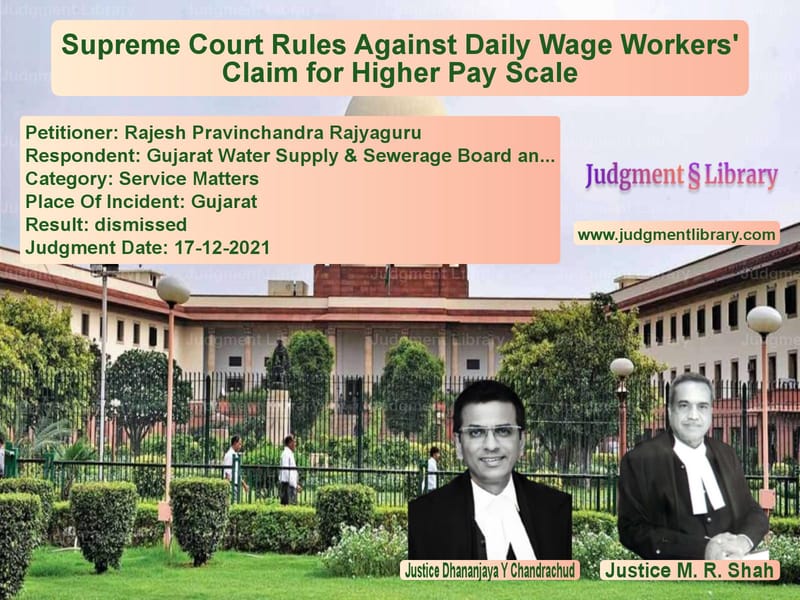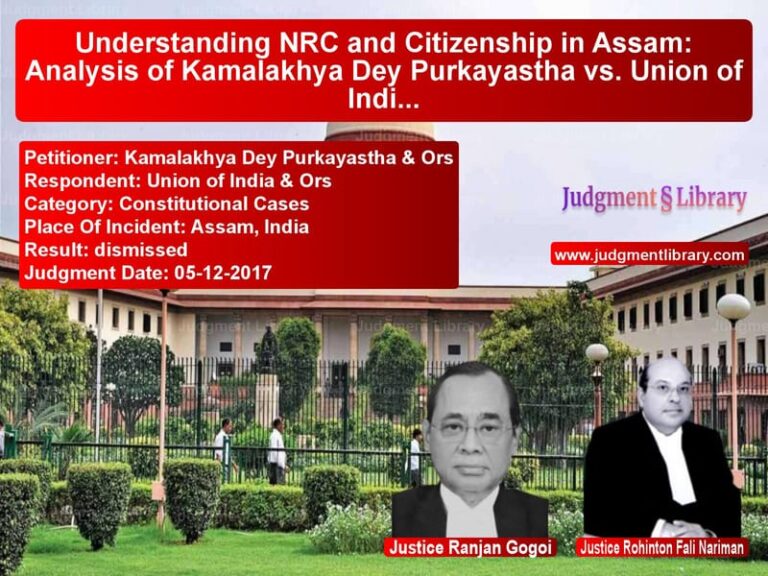Supreme Court Rules Against Daily Wage Workers’ Claim for Higher Pay Scale
The Supreme Court of India recently delivered a crucial verdict regarding the rights of daily wage employees working with the Gujarat Water Supply & Sewerage Board. The case, which involved the denial of pay scale benefits under modified government resolutions of 1991 and 1992, was dismissed by the Supreme Court, affirming that the employees were only entitled to benefits granted under the 1988 parent resolution. The ruling reinforced the principle that government resolutions must be specifically adopted by autonomous boards before they can be implemented for employees.
Background of the Case
The case originated when the appellants, who were daily wage workers employed by the Gujarat Water Supply & Sewerage Board, filed a petition seeking benefits under the government resolutions of 1991 and 1992. These resolutions had modified the earlier 1988 resolution, which provided certain benefits to daily wagers depending on their years of service.
The 1988 resolution granted daily wage workers various benefits, including fixed wages, medical allowances, and provident fund contributions. It categorized employees into three groups based on their years of service: those with more than five years but less than ten years, those with more than ten years but less than fifteen years, and those with more than fifteen years. The Board adopted this resolution and provided benefits accordingly.
However, the government later issued resolutions in 1991 and 1992, introducing new pay scales for daily wage workers. The appellants argued that since the Board had adopted the 1988 resolution, it was bound to adopt the subsequent modifications. The Gujarat High Court initially ruled in favor of the workers, directing the Board to provide the enhanced pay scale benefits. However, the Board appealed this decision, arguing that it had never officially adopted the 1991 and 1992 resolutions.
Arguments of the Appellants
The appellants, represented by Senior Counsel Sanjay Parikh, presented the following arguments:
- The Board had issued a resolution in 1990 stating that it would follow all state government policies and resolutions. Since no independent rules were framed by the Board, all subsequent government resolutions should apply automatically.
- Since the 1988 resolution was adopted, all modifications to it should also apply to the Board’s employees.
- Other employees in similar positions had already received the benefits under the 1991 and 1992 resolutions, making the denial of such benefits to the appellants discriminatory and in violation of Article 14 of the Constitution.
- The Board was formed to undertake functions previously carried out by the state government, so its employees should receive the same treatment as government employees.
Arguments of the Respondents
The Board, represented by Counsel Aastha Mehta, countered these arguments with the following points:
- The Board was an autonomous body and had never adopted the 1991 and 1992 resolutions. Adoption of government policies was not automatic.
- The Board had already granted benefits under the 1988 resolution, and further modifications were discretionary.
- Some zonal offices had erroneously applied the 1991 and 1992 resolutions, but these errors were corrected, and recoveries were initiated.
- The financial burden of implementing the 1991 and 1992 resolutions would be excessive, amounting to approximately Rs. 23.7 crores, with an annual cost increase of Rs. 2 crores.
- State government employees and Board employees were not on equal footing; hence, parity in pay scales was not a legal right.
Supreme Court’s Judgment
The Supreme Court ruled in favor of the Gujarat Water Supply & Sewerage Board, holding that:
- Government resolutions do not apply automatically to autonomous boards unless explicitly adopted.
- The Board had the discretion to decide which policies to adopt, and employees could not demand benefits under resolutions that were never implemented.
- The doctrine of ‘negative equality’ does not apply in such cases, meaning that the erroneous grant of benefits to some employees does not entitle others to claim the same mistake as a right.
- The financial burden of granting these benefits was a legitimate concern for the Board, which had the authority to make independent financial decisions.
The Court observed:
“The daily rated employees of the Board cannot as a matter of right claim the parity of pay scales with the Government employees. The Board is an independent entity, and it might have its own financial capacity; therefore, its employees cannot claim parity with the employees of the State Government.”
The Court further stated that just because some employees were wrongly given benefits, it does not mean others can claim the same error as a legal right. The judgment emphasized:
“Article 14 of the Constitution embodies the concept of positive equality alone and not negative equality. It cannot be relied upon to perpetuate illegality and irregularity.”
Key Legal Precedents Cited
- State of U.P. v. Rajkumar Sharma – Held that past mistakes cannot be used to claim benefits under Article 14.
- Punjab State Cooperative Milk Producers Federation Ltd. v. Balbir Kumar Walia – Clarified that autonomous boards must determine pay structures based on financial capacity.
- State of Gujarat v. PWD Employees Union – Distinguished between state employees and employees of statutory bodies.
Final Verdict
The Supreme Court dismissed the appeal, affirming the High Court’s decision to deny the pay scale benefits under the 1991 and 1992 resolutions. The ruling established a precedent that government policies do not automatically apply to autonomous boards and emphasized that financial sustainability is a crucial factor in determining wage structures.
This decision is a significant one, reinforcing the independence of statutory bodies and preventing unintended financial burdens on organizations that are distinct from state government entities.
Petitioner Name: Rajesh Pravinchandra Rajyaguru.Respondent Name: Gujarat Water Supply & Sewerage Board and Ors..Judgment By: Justice Dhananjaya Y Chandrachud, Justice M. R. Shah.Place Of Incident: Gujarat.Judgment Date: 17-12-2021.
Don’t miss out on the full details! Download the complete judgment in PDF format below and gain valuable insights instantly!
Download Judgment: rajesh-pravinchandra-vs-gujarat-water-supply-supreme-court-of-india-judgment-dated-17-12-2021.pdf
Directly Download Judgment: Directly download this Judgment
See all petitions in Employment Disputes
See all petitions in Pension and Gratuity
See all petitions in Judgment by Dhananjaya Y Chandrachud
See all petitions in Judgment by Mukeshkumar Rasikbhai Shah
See all petitions in dismissed
See all petitions in supreme court of India judgments December 2021
See all petitions in 2021 judgments
See all posts in Service Matters Category
See all allowed petitions in Service Matters Category
See all Dismissed petitions in Service Matters Category
See all partially allowed petitions in Service Matters Category







